(410) 764-7044
6506 Reisterstown Road, Baltimore
1205 York Road, Lutherville
6305 Belair Road, Baltimore
7809 Wise Avenue, Dundalk
October 2024
Why Does Pregnancy Cause Foot Pain?
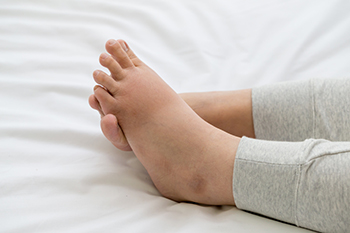
Pregnancy often brings a range of physical changes, and foot pain is a common complaint among expectant mothers. As the body prepares for childbirth, hormonal fluctuations cause ligaments to loosen, which can lead to instability in the feet and ankles. Additionally, the growing uterus increases weight and pressure on the feet, contributing to discomfort and swelling. The shift in the body's center of gravity during pregnancy can alter walking patterns, placing added stress on the feet. Edema, or swelling, commonly occurs due to fluid retention, causing feelings of heaviness and pain. Changes in foot shape, often resulting in wider and flatter feet, can also lead to discomfort. If you have developed foot pain while pregnant, it is suggested that you confer with a podiatrist who can help you to find relief during this transformative time.
Pregnant women with swollen feet can be treated with a variety of different methods that are readily available. For more information about other cures for swollen feet during pregnancy, consult with one of our podiatrists from Plaza Podiatry. Our doctors will attend to all of your foot and ankle needs.
What Foot Problems Can Arise During Pregnancy?
One problem that can occur is overpronation, which occurs when the arch of the foot flattens and tends to roll inward. This can cause pain and discomfort in your heels while you’re walking or even just standing up, trying to support your baby.
Another problem is edema, or swelling in the extremities. This often affects the feet during pregnancy but tends to occur in the later stages.
How Can I Keep My Feet Healthy During Pregnancy?
- Wearing orthotics can provide extra support for the feet and help distribute weight evenly
- Minimize the amount of time spent walking barefoot
- Wear shoes with good arch support
- Wear shoes that allow for good circulation to the feet
- Elevate feet if you experience swelling
- Massage your feet
- Get regular, light exercise, such as walking, to promote blood circulation to the feet
If you have any questions please feel free to contact our offices located in Baltimore, Lutherville, and Dundalk, MD . We offer the newest diagnostic and treatment technologies for all your foot and ankle needs.
The Importance of Treating Gout
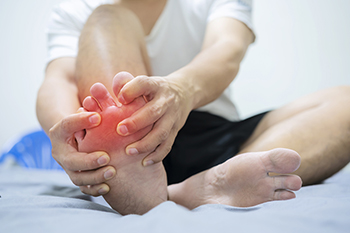
Gout is a type of inflammatory arthritis that often affects the feet and ankles, causing intense pain and swelling. It occurs when uric acid crystals build up in the joints, typically starting with a sudden, severe flare in the big toe. Symptoms include sharp, burning pain, redness, warmth, and stiffness in the affected joint. Flares can last from days to weeks, often becoming more frequent if not managed properly. Repeated gout attacks can lead to tophus formation, which are large, painful deposits of uric acid crystals in soft tissues. Bony erosion can also occur which can permanently damage the joints. Over time, this can develop into chronic arthritis, making movement difficult and painful. Treatment focuses on reducing inflammation with medications, lowering uric acid levels through lifestyle changes, with an emphasis on proper diet and hydration. If you have symptoms of gout, it is strongly suggested that you visit a podiatrist for a proper diagnosis and care.
Gout is a painful condition that can be treated. If you are seeking treatment, contact one of our podiatrists from Plaza Podiatry. Our doctors will treat your foot and ankle needs.
What Is Gout?
Gout is a form of arthritis that is characterized by sudden, severe attacks of pain, redness, and tenderness in the joints. The condition usually affects the joint at the base of the big toe. A gout attack can occur at any random time, such as the middle of the night while you are asleep.
Symptoms
- Intense Joint Pain - Usually around the large joint of your big toe, and it most severe within the first four to twelve hours
- Lingering Discomfort - Joint discomfort may last from a few days to a few weeks
- Inflammation and Redness -Affected joints may become swollen, tender, warm and red
- Limited Range of Motion - May experience a decrease in joint mobility
Risk Factors
- Genetics - If family members have gout, you’re more likely to have it
- Medications - Diuretic medications can raise uric acid levels
- Gender/Age - Gout is more common in men until the age of 60. It is believed that estrogen protects women until that point
- Diet - Eating red meat and shellfish increases your risk
- Alcohol - Having more than two alcoholic drinks per day increases your risk
- Obesity - Obese people are at a higher risk for gout
Prior to visiting your podiatrist to receive treatment for gout, there are a few things you should do beforehand. If you have gout you should write down your symptoms--including when they started and how often you experience them, important medical information you may have, and any questions you may have. Writing down these three things will help your podiatrist in assessing your specific situation so that he or she may provide the best route of treatment for you.
If you have any questions, please feel free to contact our offices located in Baltimore, Lutherville, and Dundalk, MD . We offer the newest diagnostic and treatment technologies for all your foot care needs.
Ankle Pain and Its Effects on Ankle Function
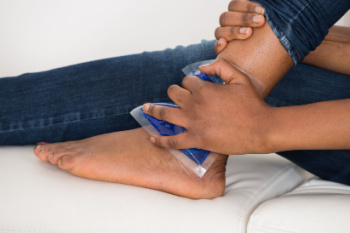
Ankle pain often directly impacts strength, balance, range of motion, and stability. When the ankle is injured or weakened, it may lead to pain, making it difficult to perform everyday movements. This pain can reduce ankle strength, as the muscles and tendons may not function optimally due to discomfort. Over time, this weakness can further affect balance, increasing the risk of falls or re-injury. Limited range of motion is another consequence, as pain restricts the joint’s ability to move freely, causing stiffness. Ankle instability can also develop when the ligaments are damaged or weakened, making the ankle prone to giving way during physical activity. If you are experiencing ankle pain, it is suggested that you schedule an appointment with a podiatrist for treatment.
Ankle pain can be caused by a number of problems and may be potentially serious. If you have ankle pain, consult with one of our podiatrists from Plaza Podiatry. Our doctors will assess your condition and provide you with quality foot and ankle treatment.
Ankle pain is any condition that causes pain in the ankle. Due to the fact that the ankle consists of tendons, muscles, bones, and ligaments, ankle pain can come from a number of different conditions.
Causes
The most common causes of ankle pain include:
- Types of arthritis (rheumatoid, osteoarthritis, and gout)
- Ankle sprains
- Broken ankles
- Achilles tendonitis
- Achilles tendon rupture
- Stress fractures
- Bursitis
- Tarsal tunnel syndrome
- Plantar fasciitis
Symptoms
Symptoms of ankle injury vary based upon the condition. Pain may include general pain and discomfort, swelling, aching, redness, bruising, burning or stabbing sensations, and/or loss of sensation.
Diagnosis
Due to the wide variety of potential causes of ankle pain, podiatrists will utilize a number of different methods to properly diagnose ankle pain. This can include asking for personal and family medical histories and of any recent injuries. Further diagnosis may include sensation tests, a physical examination, and potentially x-rays or other imaging tests.
Treatment
Just as the range of causes varies widely, so do treatments. Some more common treatments are rest, ice packs, keeping pressure off the foot, orthotics and braces, medication for inflammation and pain, and surgery.
If you have any questions, please feel free to contact our offices located in Baltimore, Lutherville, and Dundalk, MD . We offer the newest diagnostic and treatment technologies for all your foot care needs.
Plantar Warts Can Be Treated!
Easing the Pain of Morton’s Neuroma
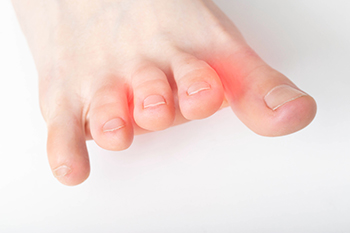
Morton's neuroma is a painful condition that affects the ball of the foot, and the pain is felt typically between the third and fourth toes. It occurs when the tissue surrounding one of the nerves leading to the toes thickens, causing sharp, burning pain or a sensation of walking on a pebble. Numbness or tingling in the toes may also be present. Morton’s neuroma is often caused by irritation or compression of the nerve, usually due to wearing tight shoes, high heels, or engaging in repetitive activities like running. Foot abnormalities, such as flat feet or high arches, can also contribute. To manage symptoms, switching to shoes with a wider toe box and low heels, and using orthotics can reduce pressure on the nerve. A podiatrist may recommend treatments such as corticosteroid injections and anti-inflammatory medications. In severe cases, surgical removal of the neuroma may be necessary. If you have a painful Morton’s neuroma, it is suggested that you schedule an appointment with a podiatrist.
Morton’s neuroma is a very uncomfortable condition to live with. If you think you have Morton’s neuroma, contact one of our podiatrists of Plaza Podiatry. Our doctors will attend to all of your foot care needs and answer any of your related questions.
Morton’s Neuroma
Morton's neuroma is a painful foot condition that commonly affects the areas between the second and third or third and fourth toe, although other areas of the foot are also susceptible. Morton’s neuroma is caused by an inflamed nerve in the foot that is being squeezed and aggravated by surrounding bones.
What Increases the Chances of Having Morton’s Neuroma?
- Ill-fitting high heels or shoes that add pressure to the toe or foot
- Jogging, running or any sport that involves constant impact to the foot
- Flat feet, bunions, and any other foot deformities
Morton’s neuroma is a very treatable condition. Orthotics and shoe inserts can often be used to alleviate the pain on the forefront of the feet. In more severe cases, corticosteroids can also be prescribed. In order to figure out the best treatment for your neuroma, it’s recommended to seek the care of a podiatrist who can diagnose your condition and provide different treatment options.
If you have any questions, please feel free to contact our offices located in Baltimore, Lutherville, and Dundalk, MD . We offer the newest diagnostic and treatment technologies for all your foot care needs.
Key Highlights of Cracked Heels
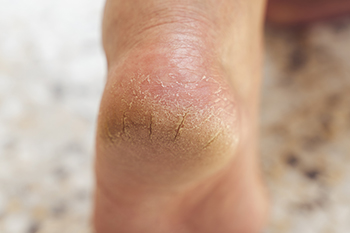
Cracked heels are a common foot condition caused by dry, thickened skin that splits or fissures around the heel. This issue often arises from prolonged pressure, dryness, or improper foot care. Symptoms include visible cracks or splits in the heel, which may be accompanied by discomfort or pain, especially when walking or standing for extended periods. In more severe cases, cracks can bleed, leading to potential infections if not properly treated. The skin surrounding the cracks may appear red or inflamed, and there might be a buildup of thickened skin. If you have severely cracked heels, it is suggested that you consult a podiatrist who can effectively treat this condition, which may include prescribed medication.
If the skin on your feet starts to crack, you may want to see a podiatrist to find treatment. If you have any concerns, contact one of our podiatrists from Plaza Podiatry. Our doctors can provide the care you need to keep you pain-free and on your feet.
Cracked Heels
It is important to moisturize your cracked heels in order to prevent pain, bleeding, and infection. The reason cracked heels form is because the skin on the foot is too dry to support the immense pressure placed on them. When the foot expands, the dry skin on the foot begins to split.
Ways to Help Heal Them
- Invest in a good foot cream
- Try Using Petroleum Jelly
- Ease up on Soaps
- Drink Plenty of Water
Ways to Prevent Cracked Heels
- Moisturize After Showering
- Skip a Shower
- Keep Shower Water Lukewarm
- Don’t Scrub Your Feet
If you are unsure how to proceed in treating cracked heels, seek guidance from a podiatrist. Your doctor will help you with any questions or information you may need.
If you have any questions, please feel free to contact our offices located in Baltimore, Lutherville, and Dundalk, MD . We offer the newest diagnostic and treatment technologies for all your foot care needs.





